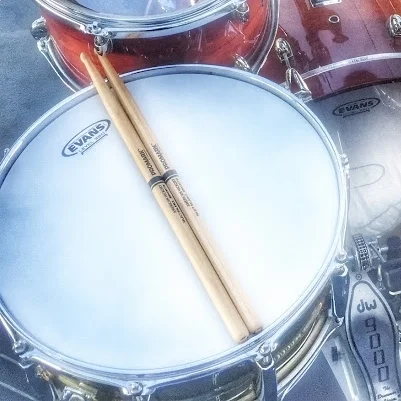First... A Quick Backstory
Last September, I embarked on an extended backpacking trip throughout Singapore, Vietnam, Thailand, Indonesia, and Malaysia. I saw the sights, ate the food, and immersed myself into other ways of life. Living out of a backpack is something that I think everybody should experience at least once in their lifetime. (Side note: If this sounds interesting to you, read the book “Vagabonding” for inspiration.)
However, the most difficult part of the trip was knowing that by committing to this trip, I’d effectively be taking a 4 month vacation from drumming…
To give you context: up until this adventure, the longest break I’d EVER taken from playing the drums was about a week or two. So… realizing that I’d be going 4 entire MONTHS without playing the drums was a tough pill to swallow.
When returning to America and getting back into it, I was terrified as to what might happen when I’d sit down at the drums again for the first time.
Would my hands be terrible? Would I have lost my musicianship? Would I need to start from scratch?
Here what I noticed when I sat down at the kit and started playing:
#1 - Muscle Memory Is More Powerful Than You Think
The most shocking discovery I noticed was that only after a few days, I felt like I was back in business. Were my chops firing at 100%? Of course not. But my muscle memory stayed intact. In a way, returning to the drums after an extended break is just like the experience of riding a bike, driving a car, or swimming. You can take a long break from that activity and your body somehow still knows what to do when you come back to it. Muscle memory is extremely powerful; if you’ve put in the time and gotten the reps, it will stay with you for life!
#2 - My mind became re-sensitized to the drums
Ok, here’s where it gets interesting… Though my muscle memory stayed relatively intact, taking a long break from the drums in effect turned off the “autopilot” in my mind that I had developed from almost 2 decades of playing the drums. In other words, when you’re playing drums all the time, you become “desensitized” to what your body is actually doing because, simply put, you just do it! Returning to my previous examples of riding a bike, swimming, or driving: your body may know what to do automatically, but coming back to the activity after a break makes you feel as if you’re an outside observer watching your body perform the motions. In the case of drumming, the same experience happened. Taking a break allowed me to observe how I actually use my fingers, wrists, and arms as I play. I felt like an outside observer watching my body move as I played. From this place, I realized that this could be turned into a unique and wonderful opportunity to re-examine my technique with “beginner’s mind.”
#3 - I developed a deeper sense of gratitude
Every day I feel thankful not only that I have the opportunity to play the drums, but that I get to play them for a living! But (stay with me here), it too is a career just like any other. There are highs and lows, moments of inspiration and moments of frustration. In recent years, playing 200+ dates per year has made me feel so comfortable on stage that I started to feel like I had lost my edge a bit. By this, I mean that I could feel myself losing that deep sense of pure joy I once had when jumping on the kit after school as a kid. However, returning to the stage after an extended break reignited that fire inside of me; it made me remember how FUN it is to play the drums! I once again felt that adrenaline pumping through my body, and I felt alive playing with “beginner’s mind,” which can only be experienced after taking a long break. I realized at that moment something important: Time spent away from the drums can be just as beneficial as time on the drums.
Would I do it all over again?
Though I didn’t want to intentionally take an extended vacation from drumming, I’m so glad that I did it. It allowed me to fall in love with the drums all over again, made me appreciate the gift that I have to share with the world, and reminded me not take your gifts in life for granted.
If you feel like you’ve hit a rut in your drumming (or any skill set that is important to you), try spending a month or two away from it. It’s ok to push that figurative “reset button” from time to time. You might be surprised at how you’ll grow by doing so.






